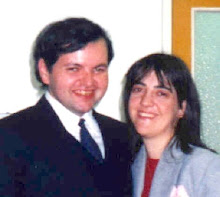If you look at the Web pages devoted to the polemic of Darwinism versus Creationism and Intelligent Design, you'll notice the great amount of biologists taking part in them. Many of the participant biologists back an undefined evolutionism, only partially Darwinist, sometimes incorporating punctuationistic or symbiogenetic elements. The way they participate is very interesting. In many cases, they begin with a friendly and pedagogical attitude, speaking of facts, of classic tests, also of the sense in which Darwinism and Creationism are or are not scientific theories. In time, their attitude usually becomes rather rougher, until they adopt a unionist way of speaking; despising anyone who "talks with no enough knowledge". They finally use expressions such as "obscurantism", "dogmatism", "pseudoscience", and any other qualification whose objective seems to be giving a sudden end to the debate, just to aboard "more interesting subjects". Nevertheless, they go on participating, and they attack again against all odds. Sometimes they write just a sardonic sentence and they stay at margin, but we still feel their presence.
Why does it happen? I can imagine a very simple reason: boredom. At least the more popular version of evolutionism -the 50’s Great Synthesis, that joined Darwinism with Population Genetics- has become boring. That is not for lacking of interesting elements. We'll not object neither its verisimilitude, nor its macro evolutionary achievements. That is not the problem. The problem is that Synthesis is able to explain everything about life almost successfully. That is horrible. Nothing is more horrible than to manage to reach the XVIII century Enlightenment goal: abolishing obscurantism, abolishing all shadow and all mystery.
What does a biologist who dedicates to count genes, to compare and to process arduous phyllogenetic trees in his free time? He looks for enemies. His task is a tough one. He will get to know in detail every living being branch sprout from the common ancestor's tree, he will manage to imagine how the first colony of bacteria appeared in the primitive soup, and later it will arrive to a Great Emptiness. Just when Evolutionism did that, it will quench itself in a fate of glory and forgetfulness. As the evolutionary biologist senses this is what is going to happen, he watches around and looks for enemies. He knows animals need someone to fight with. Since he has sublimated too much, along so much time, biologist come in the virtual space and shows his claws and his teeth thirsty of blood. He wishes to face a difficult struggle and looks for getting hurt, just linguistically hurt.
Perhaps, in the middle of the fight, something the enemy could say would surprise him, something that would save him from the torture of knowing everything about his speciality. Perhaps, he would do the same as those viruses, which carry along with them a part of the genome of the cell they have destructed. If that happens, the discussion has not been in vain.
Copyright Daniel Omar Stchigel. All rights reserved .
Why does it happen? I can imagine a very simple reason: boredom. At least the more popular version of evolutionism -the 50’s Great Synthesis, that joined Darwinism with Population Genetics- has become boring. That is not for lacking of interesting elements. We'll not object neither its verisimilitude, nor its macro evolutionary achievements. That is not the problem. The problem is that Synthesis is able to explain everything about life almost successfully. That is horrible. Nothing is more horrible than to manage to reach the XVIII century Enlightenment goal: abolishing obscurantism, abolishing all shadow and all mystery.
What does a biologist who dedicates to count genes, to compare and to process arduous phyllogenetic trees in his free time? He looks for enemies. His task is a tough one. He will get to know in detail every living being branch sprout from the common ancestor's tree, he will manage to imagine how the first colony of bacteria appeared in the primitive soup, and later it will arrive to a Great Emptiness. Just when Evolutionism did that, it will quench itself in a fate of glory and forgetfulness. As the evolutionary biologist senses this is what is going to happen, he watches around and looks for enemies. He knows animals need someone to fight with. Since he has sublimated too much, along so much time, biologist come in the virtual space and shows his claws and his teeth thirsty of blood. He wishes to face a difficult struggle and looks for getting hurt, just linguistically hurt.
Perhaps, in the middle of the fight, something the enemy could say would surprise him, something that would save him from the torture of knowing everything about his speciality. Perhaps, he would do the same as those viruses, which carry along with them a part of the genome of the cell they have destructed. If that happens, the discussion has not been in vain.
Copyright Daniel Omar Stchigel. All rights reserved .




No comments:
Post a Comment